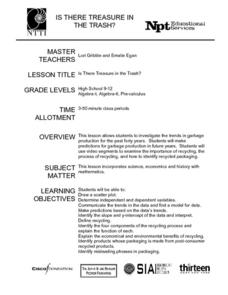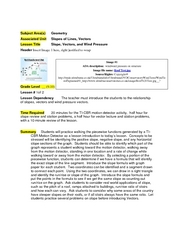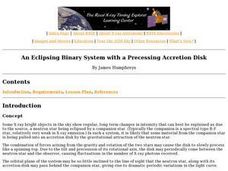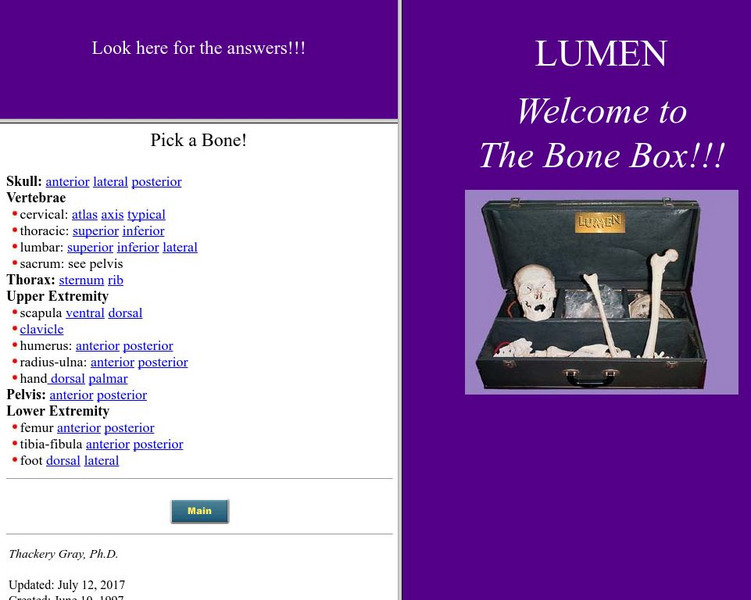Curated OER
Identifying Organisms
In this organisms worksheet, 9th graders look at each picture of insects and use the key at the bottom of the sheet to determine which order they belong to. Then they explain which insect is a true bug and which is a true beetle and...
Curated OER
Is there Treasure in Trash?
More people, more garbage! Young environmentalists graph population growth against the amount of garbage generated per year and find a linear model that best fits the data. This is an older resource that could benefit from more recent...
Curated OER
Unidentified (Flying?) Arthropods
Beginning biologists learn the characteristics of the five classes in the arthropod phylum. A student handout lists characteristics to help them identify five specimens. You will need to collect an example of each: arachnida, crustacea,...
Curated OER
Terrabagga Activity Using a Magnetometer
Clever! Earth science learners construct a model of a planet containing a magnetic core. The planet, Terrabagga, is made out of a paper grocery bag, magnets, a dead D battery, and rubber bands. Pictures of each step of the construction...
Curated OER
Angles: Angles, Angles, Everywhere
Students estimate and accurately measure the size of angles communicate with the appropriate geometric terms and symbols to describe and name angles, lines, line segments, rays
Curated OER
Mr. Bo Jangle, What's Your Angle?
Third graders explore angles. In this geometry lesson, 3rd graders identify and define acute, obtuse, and right angles. Students form angles with their bodies, find angles in picture books, and record angles found outside in their math...
Curated OER
Graphing Linear Motion
For this graphing linear motion worksheet, students answer 20 questions about velocity of objects, the distance they travel and the time. They interpret a graph of position vs. time and identify the velocity at certain point on the graph.
Curated OER
What is the Evidence for Evolution?
Students identify one object that would tell the story of their lives. In groups, they determine what can and cannot be told from objects left behind. After watching a video, they compare and contrast chicken bones to human bones. To...
PBS
Stories of Painkiller Addiction: Contemplating Nature vs. Nurture
Does having an addict in your family make it more likely to become one yourself? Explore the genetic risk factors, as well as the prominent environmental influences, for substance addiction in a instructional activity that encourages...
Curated OER
As the Sun Burns
Students examine the types of light the sun gives the Earth. They describe the electro-magnetic spectrum and how to protect themselves from different types of light. They identify the layers of the atmosphere as well.
Curated OER
Larva and Adult Antlion Body Parts
Students identify the major body segments of antlions. Through the use of diagram worksheets, students label the various body parts of the antlion. They review the life cycle of antlions from the larva stage to adult. Several activities...
Curated OER
Slope, Vectors, and Wind Pressure
A hands-on lesson using the TI-CBR Motion Detector to provide information to graph and analyze. The class uses this information to calculate the slope of motion graphs and differentiate scalar and vector quantities. There is a real-world...
Curated OER
Only the Shadow Knows
Middle schoolers become familiar with the causes for formation of shadows. They create shadows, compare the size and shape of the shadow with the actual object, engage in shadow play theatre, and discover what happens to shadows when...
Curated OER
Start at the Very Beginning
Students explore ocean ecosystems. In this cross curriculum art and oceans lesson, students create a collage featuring three-finger algae using sand paper, tissue paper, and construction paper.
Curated OER
Reading Weather Maps
Fourth graders the symbols that are used on weather maps. They develop five day forecasts based on information they gather from weather maps in the newspaper and on the Internet.
Curated OER
As the Sun Burns
Students test commercial sunscreens or sunglasses for accuracy of their Sun Protection Factor. They devise a method for testing UV beads with a visual clues which they publish as research. They investigate occupations such as...
Curated OER
An Eclipsing Binary System with a Precessing Accretion Disk
Students work together to complete an experiment over binary sources. They determine values for the orbital period of certain objects and interpret intensity changes. They also calculate a value for the period of precession of an...
Loyola University Chicago
Loyola University Medical Education Network: Welcome to the Bone Box
An interactive site that provides a picture of a skeleton segment. On the picture is a number with a line pointing to a part of the skeleton. When you click on the number the part is identified.

















